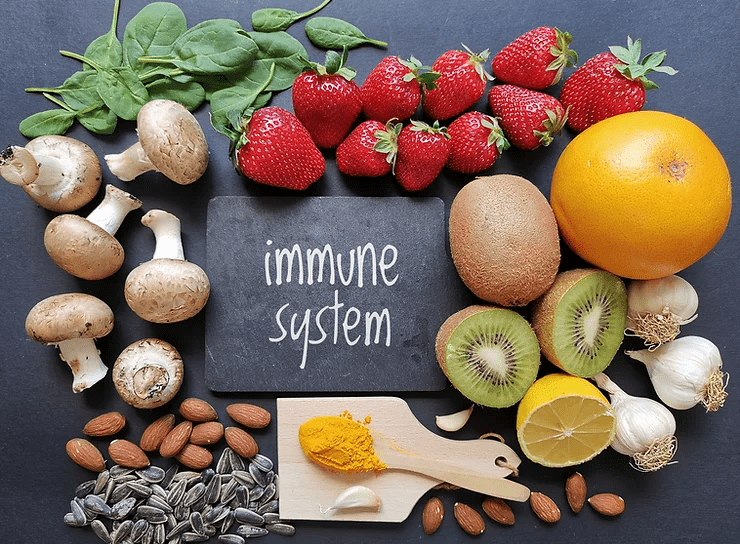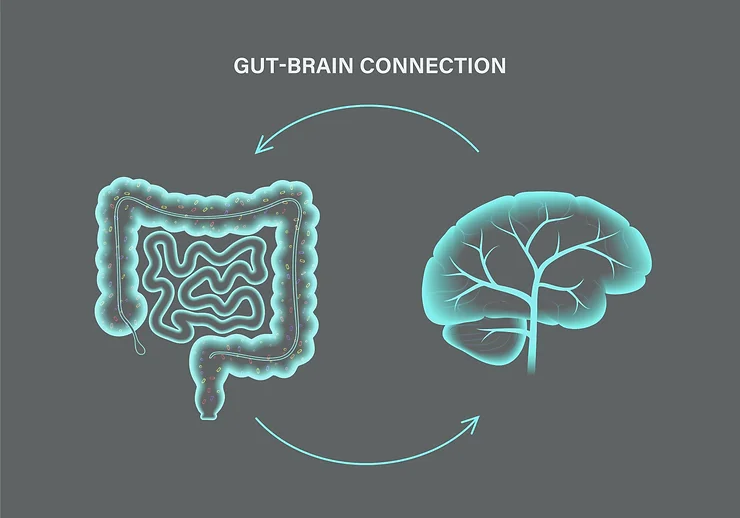A Strong Immune System Requires a Healthy Gut
December 23, 2021

Most of your immune system lives in your gut…so invest in your gut to stay well!
Scientists estimate that approximately 70 percent of the immune system resides in the gut. If we have poor gastrointestinal health, then we will likely have a weakened immune response. Therefore, if you are interested in improving the health of your immune system, start with your gut.
The microbiome, which includes trillions of microbes and their genes living primarily in the large intestine, plays a significant role in how the immune system functions. Studies indicate that maintaining a healthy gut microbiome is directly related to our own health.
How do I know if my gut health is suboptimal?
Some people are very aware that their digestive system could use improvement as evidenced by gas, bloating, and occasional constipation or diarrhea. Maybe you’ve been diagnosed with Irritable Bowel Syndrome (IBS) and you’re not sure what to do about it. Others may be unaware that their intestinal environment needs attention because their bathroom habits “are just fine.” Regular bathroom habits are not the only indicator of gut health status.
Dysbiosis, which is an imbalance of microbes in the intestinal tract, can cause symptoms outside of the GI tract. Symptoms such as fatigue, brain fog, mood imbalance, weight loss resistance, and migraine headaches may be related to poor gut health. Of course there are other contributing factors to these listed health issues, but improving the intestinal environment should be incorporated in an overall strategy to improve these health problems, as well as a method of supporting immune system function.
How does the gut microbiome support the immune system?
Your intestinal tract is highly trained to detect foreign invaders that may have been consumed through food or beverages. If you think about it, your digestive tract is just one long tube starting from your mouth and ending at the anus where waste is excreted. It is a tube that is exposed to the outside world in terms of everything that we consume travels through this tube. If we consume a food that has been contaminated, the digestive tract is on guard to detect the contaminant and get rid of it by its own immune response. If we didn’t have an immune response at the gut level, we would be getting sick all the time with exposure to contaminants in our food and water supply. We will get sick with a high exposure to certain contaminants, but low-level exposure is covered by the body’s natural immune system.
Think about your gut microbiome as an army of microbes with different jobs to do in order to keep your health safe. If the army (i.e., group of microbes) is lacking in certain departments, then your team of microbes can’t perform well enough to keep your immune system strong and keep you healthy. We must have a large diversity of good microbes and an abundance of them flourishing primarily in our large intestines. The bad bacteria live there too, but as long as they’re kept to a minimum, they won’t harm our health.
How can I support a healthy microbiome for a strong immune system?
Here is the bad news before the good news! The Standard American Diet (SAD) is not supportive of a healthy microbiome. It is high in sugar, fat, salt, and processed foods which lack nutritional value and contain artificial ingredients that are non-health promoting. The average American does not consume enough prebiotic and probiotic rich foods to support good intestinal microbial balance, and then we top off with chronic stress, lack of sleep, and insufficient physical activity to create the perfect storm for microbiome chaos.
The good news…here are a few tips to get you started on the road to a balanced microbiome for immune support:
- Eat more fruits and vegetables (5-10 servings daily), preferably fresh and organic
- Eat a diet rich in fiber from a variety of sources (fruit, vegetables, whole grains, legumes, nuts, and seeds)
- Include more probiotic foods (yogurt, kefir, sauerkraut, miso, tempeh, and fermented vegetables)
- Include more prebiotic foods (onions, garlic, artichoke, asparagus, under ripe bananas, root vegetables, legumes, and most fruits and vegetables in general)
- Eat a clean diet rich in whole foods and avoid packaged processed foods
- Drink plenty of water (approximately half your body weight in ounces daily)
- Keep stress to a minimum and incorporate daily stress management techniques
- Get plenty of sleep (7-9 hours every night)
- Avoid alcohol or keep intake to a minimum (< 1 drink/day for women; < 2 drinks/day for men)
- Get outside in the fresh air every day if possible
- Be active regularly – whether it’s a 15-minute walk or a moderate intensity 60-minute workout, physical activity supports a healthy microbiome
Let’s face it. Nobody likes to get sick. Investing in a strong immune system is the best way to prevent illness…and a strong immune system starts with a healthy gut. If you are struggling with gut health imbalances or problems, or you catch colds frequently, consult a Registered Dietitian Nutritionist who specializes in gut health nutrition for support. Check out other articles on nutrition, lifestyle, and gut health at https://www.kirkmannutrition.com/blog.
Sources:
Shanahan F, van Sinderen D, O’Toole PW, Stanton C. Feeding the microbiota: transducer of nutrient signals for the host. Gut. 2017 Sep;66(9):1709-1717. doi: 10.1136/gutjnl-2017-313872. Epub 2017 Jun 29. PMID: 28663354.
Shi N, Li N, Duan X, Niu H. Interaction between the gut microbiome and mucosal immune system. Mil Med Res. 2017 Apr 27;4:14. doi: 10.1186/s40779-017-0122-9. PMID: 28465831; PMCID: PMC5408367.
Galland L. The gut microbiome and the brain. J Med Food. 2014 Dec;17(12):1261-72. doi: 10.1089/jmf.2014.7000. PMID: 25402818; PMCID: PMC4259177.
Lach G, Schellekens H, Dinan TG, Cryan JF. Anxiety, Depression, and the Microbiome: A Role for Gut Peptides. Neurotherapeutics. 2018 Jan;15(1):36-59. doi: 10.1007/s13311-017-0585-0. PMID: 29134359; PMCID: PMC5794698.
Diener C, Qin S, Zhou Y, Patwardhan S, Tang L, Lovejoy JC, Magis AT, Price ND, Hood L, Gibbons SM. Baseline Gut Metagenomic Functional Gene Signature Associated with Variable Weight Loss Responses following a Healthy Lifestyle Intervention in Humans. mSystems. 2021 Oct 26;6(5):e0096421. doi: 10.1128/mSystems.00964-21. Epub 2021 Sep 14. PMID: 34519531; PMCID: PMC8547453.
Arzani M, Jahromi SR, Ghorbani Z, Vahabizad F, Martelletti P, Ghaemi A, Sacco S, Togha M; School of Advanced Studies of the European Headache Federation (EHF-SAS). Gut-brain Axis and migraine headache: a comprehensive review. J Headache Pain. 2020 Feb 13;21(1):15. doi: 10.1186/s10194-020-1078-9. PMID: 32054443; PMCID: PMC7020496.
Ticinesi A, Lauretani F, Tana C, Nouvenne A, Ridolo E, Meschi T. Exercise and immune system as modulators of intestinal microbiome: implications for the gut-muscle axis hypothesis. Exerc Immunol Rev. 2019;25:84-95. PMID: 30753131.

Lisa Kirkman is a Registered Dietitian and Functional Nutritionist who helps people move beyond treating symptoms and resolve their health challenges. Using advanced functional lab testing and evidence-based practices, Lisa and her clients team up to resolve underlying imbalances, heal the gut, and restore vibrant whole-body health.
Can’t Eat Without Bloating?




